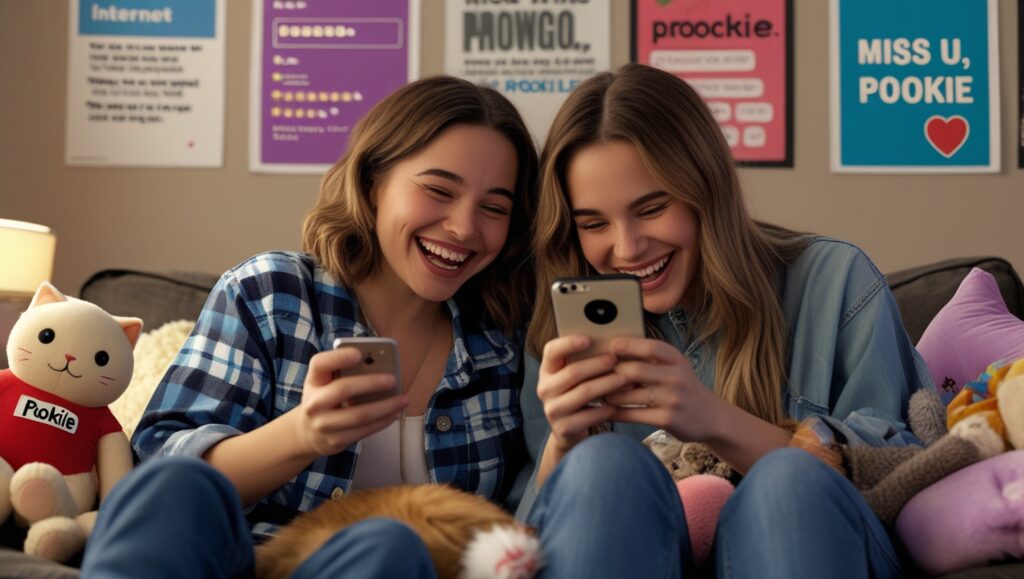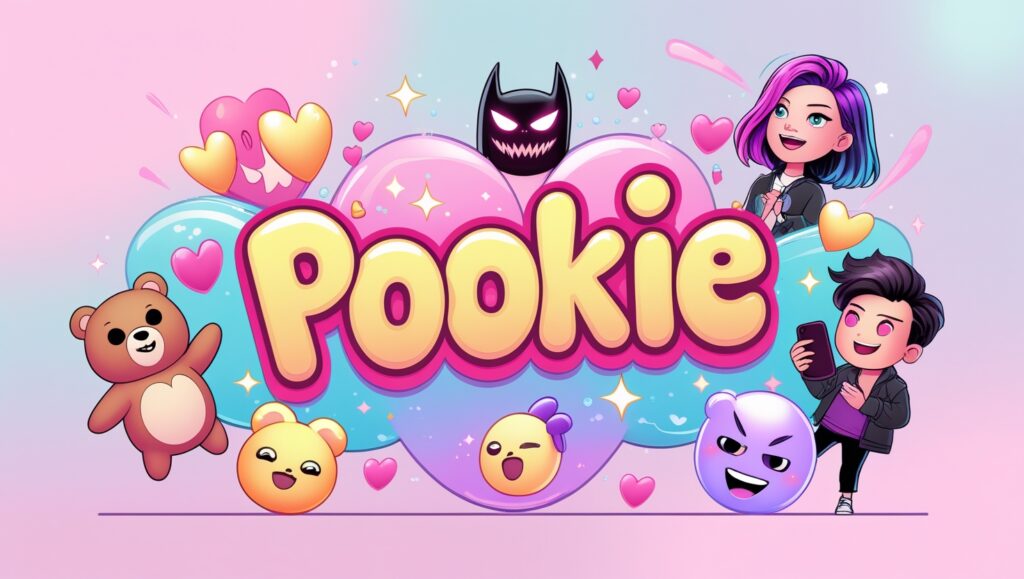What Does Pookie Mean? Let’s Break It Down (Lovingly)
Ah, pookie. Just saying it feels like giving your tongue a hug. But “what does pookie mean“, really? If you’ve been on TikTok, Twitter, or even just texting your significant other lately, there’s a good chance you’ve seen (or heard) this quirky little word thrown around like confetti.
I used to think “pookie” was just a pet name people in overly clingy relationships used—you know, the kind of thing you hear in a baby voice right before your dinner appetite vanishes. But then I noticed it popping up in memes, friend convos, rap lyrics, and even sarcastic tweets like “It’s okay, pooikie, they just don’t understand your villain arc.” And I thought, okay… what’s going on here?
So, I did what any curious, caffeine-fueled blogger would do: I went on a deep dive into the internet rabbit hole to find out what “poookie” really means—and why the world seems obsessed with it.
Let’s talk pookie.
The Original “Pookie”: A Cute Nickname with Roots
Let’s start from the beginning. “Poookie” has been used for decades as a term of endearment, especially in families or romantic relationships. Think of it like “sweetie,” “babe,” or “snugglebug” (okay, maybe that last one’s just me).
Some people say it originated from French Creole culture, where “pouqui” was used affectionately, but in English-speaking households, “pokie” became a go-to nickname for children or loved ones. My aunt used to call her dog Poookie—and I know at least three people who had a childhood teddy bear named that.
So in its purest form, “pookie” means someone you love deeply—usually in a cute, innocent way.
But Wait… TikTok Changed Everything
Fast forward to the 2020s, and “pokie” is everywhere. Thanks to platforms like TikTok, the word has exploded into a slang term with layers—funny, ironic, romantic, even dramatic.
Example:
“Pookie didn’t mean to cheat on you, he was just emotionally damaged 😭”
Yeah. That kind of “poookie.” We’re not talking about a baby name anymore. Now, it’s a full-blown cultural phenomenon.
In TikTok-speak:
- “Pookie” can still mean your boo, your bestie, or someone you’re fond of.
- But it can also be used ironically—to make fun of people who romanticize red flags or to exaggerate emotional drama.
- Sometimes it’s even used to describe yourself, as in “I’m just a little pookie who needs coffee and validation.”
It’s kinda genius.
Meme Culture: The Pookie Renaissance
Here’s where things get chaotic—in the best way.
If you search “pookie” on Twitter or Tumblr, prepare to laugh and/or cringe. You’ll find:
- Over-the-top emotional memes:
“Pookie’s crying in the rain again. It’s giving tragic poetry.” - “Villain era” references:
“Pookie’s done being nice. She’s cutting her bangs.” - Toxic relationship jokes:
“I know he’s evil, but he’s my pookie 😭”
At this point, “poookie” is a meme format all its own. It’s the new “baby girl” (sorry, Pedro Pascal fans), and it fits any character you want to assign dramatic emotional weight to.
Even villains. Especially villains.
Who Uses “Pookie” (and Why It’s So Addictive)
Let’s talk about the people keeping “poookie” alive and well. Spoiler: it’s mostly Gen Z, but the term is spreading fast.
Here’s why people love using “pookie”:
- It’s cute without being serious – You can say it playfully, with zero romantic commitment.
- It adds instant drama – Whether you’re joking or being extra, “poookie” just makes sentences funnier.
- It’s deeply flexible – It works for a lover, a friend, a pet, or even an inanimate object. (Yes, I’ve called my AirPods case “poookie.” No regrets.)
Tip:
If someone calls you “poookie,” don’t panic. It might be affectionate… or sarcastic. Either way, you’ve made an impression.
Pop Culture Pookies: Celebs, Characters, and Iconic Moments
Okay, let’s name some actual pop culture “pookies.” Because the internet loves labeling fictional characters (or real celebrities) as pookies, and it’s… honestly adorable.
Some fan favorites:
- Kylo Ren – Messy, emotional, and kinda romantic? Classic pokie energy.
- Rue from Euphoria – Chaotic, sad, lovable… basically the blueprint.
- Wednesday Addams (Netflix Version) – Emotionally distant but everyone’s obsessed? Poopkie-core.
- Any overly dramatic villain with good hair – They’re all pookies in someone’s eyes.
On TikTok, you’ll see edits with soft music, sparkles, and captions like “my little poookie didn’t deserve this” over scenes of betrayal, heartbreak, or destruction.
It’s both hilarious and weirdly sweet. That’s the magic of the pokie meme.

“Pookie” in Relationships: Love It or Leave It?
Let’s get real for a second. Using “pokie” in a relationship is… a choice.
Some couples genuinely love it. It’s cute, intimate, and makes them feel like they’re in their own little world. Others (like me) find it a little too saccharine. I’m more of a “dude” or “babe” kind of person. But hey, no judgment.
If your partner calls you poookie and you’re okay with it? That’s sweet.
If it gives you the ick? Set boundaries, my friend.
Pro tip:
Before using “poookie” unironically in a new relationship, test the waters with something low-stakes like:
“Can I call you pookie or is that illegal in your love language?”
You’ll thank me later.
The Dark Side of Pookie: Overuse and Cringe Moments
Listen, I love internet trends as much as the next online-chronically-brained person. But I have to say it:
Not every word needs to be pookie-fied.
There’s a fine line between playful and cringe overload. If you’re calling your landlord, your dentist, and your microwave “pookie,” you might need a reality check.
Also, overusing “pookie” in every caption, DM, or comment can come off as forced. Like anything cute or ironic, it loses its charm if it’s done to death.
So use it wisely. Let your inner pookie shine—but don’t let it burn out.
Regional and Cultural Variations
It’s worth noting that not everyone uses or hears “pookie” the same way. In some communities, especially in African-American Vernacular English (AAVE), “pookie” has specific references, sometimes tied to:
- Nicknames in families or neighborhoods
- Stereotypes (not always positive) in pop culture
- Characters from movies/shows like “New Jack City” (remember Pookie, played by Chris Rock?)
So depending on context and tone, “pookie” can be sweet, ironic, funny, or complex.
That’s why I always say: Context is king. Or in this case, pookie.
Should You Use “Pookie”? Let’s Talk Guidelines
Here’s my official guide to being a responsible pookie user:
✅ Use it if:
- You’re being cute or flirty with someone who’s into it
- You’re joking around with friends
- You’re making fun of emotionally unhinged fictional characters
- You’re trying to make a sad meme 10x funnier
❌ Maybe avoid if:
- You’re at work (unless your job is literally TikTok)
- You’re not sure what it means in that specific community or context
- The person clearly doesn’t like cutesy nicknames
- You’re writing a serious email. Please. Don’t email your boss “Thanks, pookie.” I beg.
Final Thoughts: Embrace the Pookie (Within Reason)
So—”what does pookie mean?“
It means love, it means chaos, it means you accidentally made a fictional villain your emotional support character. It’s a word that lives in between sincerity and satire, sweetness and silliness.
In other words? It’s extremely online. And I kinda love that.
If someone calls you “pookie,” smile. You’re part of the internet’s weird little inside joke—and maybe someone’s favorite person.
Just remember: with great pookie power comes great responsibility.
TL;DR: Your Pookie Cheat Sheet
- “Pookie” originally = cute nickname for someone you love
- Modern use = layered slang, ironic, sweet, or dramatic
- Used in memes, relationships, friend convos, fan edits
- Can be adorable or cringe, depending on delivery
- Context and tone matter—always read the room (or thread)
Got your own favorite use of “pookie”? Let me know. I might just add you to the honorary Pookie Hall of Fame (not a real thing… yet).
Until next time, stay chaotic, stay kind—and give your inner pookie a hug. 💕
